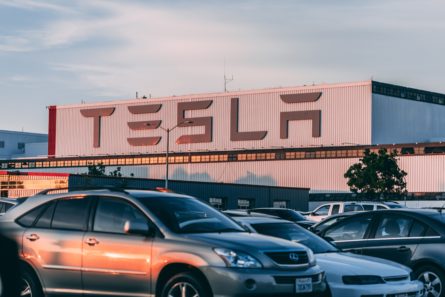Explainer Episode 36 – Restrictions on Direct Car Sales

In this episode, Adam Thierer interviews Professor Daniel Crane regarding state restrictions on direct car sales and their implications for automobile markets, including the antitrust concerns they may raise.
Transcript
Although this transcript is largely accurate, in some cases it could be incomplete or inaccurate due to inaudible passages or transcription errors.
[Music and Narration]
Introduction: Welcome to the Regulatory Transparency Project’s Fourth Branch podcast series. All expressions of opinion are those of the speaker.
Jack Derwin: Welcome to the Regulatory Transparency Project’s Explainer Podcast, part of RTP’s Fourth Branch podcast series. My name is Jack Derwin, and I’m Assistant Director of RTP at The Federalist Society.
Today, I’m very excited to be joined by Daniel Crane and Adam Thierer to discuss restrictions on direct car sales. Dan Crane is the Frederick Paul Furth Sr. Professor of Law at the University of Michigan’s Law School and is a widely-recognized authority in antitrust law. Previously, he held teaching roles at the Cardozo School of Law, New York University School of Law, and the University of Chicago Law School. And our host today, Adam Thierer, is a senior fellow at the Marcatus Center, where he specializes in innovation, entrepreneurialism, and internet and free speech issues with a particular focus on the public policy concerns surrounding emerging technologies. With that, I’ll hand it to over to you, Adam.
Adam Thierer: Well, thanks, Jack. And thank you, Professor Crane, for joining us here today. It’s a real pleasure.
Daniel Crane: My pleasure to be on, Adam. Thank you.
Adam Thierer: So Dan, let me begin by asking you to take a step back in time and explain to our listeners how it came to pass that in 2022, in the United States of America, it is against the law to sell — for a manufacturer of automobiles to sell a car directly to consumers in many states across the nation because I think that would strike many people as a bit crazy. We, after all, allow for direct sales of almost everything else in this world. And besides certain restrictions in, say, the liquor industry and a few others, there aren’t too many cases of states still continuing to directly block the sale of what is otherwise considered a legal product to consumers directly. So let me ask you to step back and explain to us how and when that started in the US.
Daniel Crane: Sure. So you have to go back to the 1940s and ‘50s when you had basically the big three car companies—GM, Ford, and Chrysler—and they were perceived as very, very powerful—and they were very powerful. And then you had car dealers, which were mostly mom-and-pop businesses in small towns, that argued that they were being unfairly taken advantage of by their franchising manufacturers. And so, they argued in the states for protections—dealer protection laws—to alleviate the unfair bargaining power between the franchising manufacturers and the dealers. Almost every state passed some version of a dealer protection law, and Congress in Washington passed some limited versions of dealer protection. But one of the key features of many of the state laws was a prohibition on direct sales or even direct service. And the idea was that if Ford or General Motors could both franchise independent dealers but also open their own stores in competition with their dealers, they would unfairly undermine their own dealers at retail.
So let’s assume that that was true in 1950. The world’s obviously changed considerably since that time. Not only do we have a much, much more competitive car market. There are not just the big three, but many different choices in terms of manufacturers selling cars, both foreign and domestic. But also, the dealers, of course, are no longer organized as mom-and-pops predominantly. Dealers are often organized as enormous multibillion-dollar, multistate businesses controlling many, many dealerships under one corporate umbrella. So all the dynamics have changed since 1950s, but many of these laws are still on the books in many states.
Adam Thierer: Right. And so, let’s talk about the evolution of the modern automotive industry and the distribution of vehicles because, as you noted, things on the ground have changed quite a bit. And obviously, we’ve had the rise of Tesla as a maker of electric vehicles. And now you got Rivian and Lucid, Lordstown, a number of others. So we have more competition on that end. And we also have a very different — as you noted, very different marketplace on the dealer side of things. First of all, explain to us why we haven’t seen more changes in this regard to the natural state of play in terms of these franchising regulations. Why haven’t more companies been able to break through? And where have we had some success? How many states do allow for direct sales, and how do things play out differently there than in the restricted states?
Daniel Crane: Yeah. So I’m going to start with the second part of the question, which is what’s the current landscape in terms of states allowing or not allowing direct sales. And it’s not easy to give a simple answer because there’s lots of variety in state laws as to what’s allowed or not allowed. And you also have to think about both sales and service. People often focus particularly on the sales issue, which is critical, but I think the service issue is even more critical.
So in a state like Louisiana, for example, direct sales are prohibited, which means that a Louisiana resident cannot go to a local Tesla dealership and buy the car, but they can still buy a Tesla. They can buy it over the internet for delivery. They can go to another state, buy it, and bring it back. So the sales part is actually not that big of an impediment. The bigger issue is, “Can Tesla have a service center in Louisiana?” Because it’s one thing to buy your car from out of state, it’s another thing to have to drive to another state to get service. So when you look state by state, there are a variety of different laws in place—some states that allow a certain number of company-owned stores, some states that prohibit it entirely, other states like California that say, “Any company can have their own stores, but they can’t open it within ten miles of their own franchised dealerships.” So there’s a lot of variety state by state. I would say, in rough terms, it’s kind of 50/50 as to whether states are overall open or overall closed.
Now, the question of why we haven’t seen more inroads — well, first of all, we have seen considerable progress made on the ground since Tesla launched in about 2014 and made clear that it thought it was imperative for it to be able sell direct and service its own cars. And in many states, either through legislation or judicial decisions or interpretation by courts of existing statutes, Tesla’s been able to get in and compete. But why there is still so much resistance, I think partly it’s the fact the franchised model with these dealer protection laws was built around the internal combustion engine. And in so far as we are talking about sales of internal combustion vehicles, the model worked okay. I mean, it wasn’t necessarily optimal to prohibit direct sales, but it worked okay.
The reality, though, is that the economics of selling and servicing electric vehicles are very different than the models for selling and servicing internal combustion cars. And it makes it really challenging to scale up and get market penetration for EVs if they have to play using the rules from 1950s for internal combustion distribution. So I think it’s really because Tesla brought that challenge beginning around 2014 and has been fighting state by state. And we’re just now seeing the critical mass of other companies that you mentioned like Rivian and Lucid coming to market and also frankly the legacy manufacturers starting to realize that they need to change their distribution model too that we’re really seeing this reaching kind of a critical moment in many states.
Adam Thierer: Right. Well, let me play devil’s advocate for a moment. We obviously don’t have a representative here from the dealerships, so let me try to do my best to pretend to be one and just say, “Well, hey, you just mentioned the service centers and all the good things that local dealerships can offer a local community. And hey, how about test drives? People need to go out and literally kick the tires on this thing and figure out if it’s what they want.” So why shouldn’t that model be in some way shape or form protected going forward?
Daniel Crane: Well, I absolutely agree with you that most customers want to test drive a car before they buy it. They want to kick the tires. One of the ironies is that it’s these dealer laws that are inhibiting customers from being able to do that for lots of cars. The argument for a Tesla or a Rivian is not, “Let us do all the sales over the internet.” They can do that right now. No state can stop them from selling a customer a car over the internet. Their argument is, “We want to be able to have our own store on the ground where a customer can go in and actually do that test drive or kick the tires.” And incredibly, that’s illegal in many states.
And in many states, Tesla can’t open a store—Rivian can’t open a store—which means that the customer is now put to the inconvenience of having to go to another state to do that test drive to see whether or not that car makes sense for them. So this is not a request by the electric vehicle companies that they just sell online or do everything virtually. Actually, they want to do bricks-and-mortar. They want to have that store, that service center, that’s going to create local jobs, that’s going to give customers a local point of contact. That’s exactly what this battle’s all about.
Adam Thierer: Yeah. I know I’ve read this in some things you’ve written about and this issue, that there are other potential costs associated with protecting yesterday’s business model, franchising arrangement or a local dealership arrangement. And one of the things that’s interesting to me is that a lot of the dealers themselves—like Ford and Chevy and others—they’ve pointed out recently that they’ve gotten a lot of blowback because of actions by local dealerships to raise prices uniformly and in a certain direction—namely up, up, up—and that there are other issues associated with whether or not they’ll be able to roll out EVs through the traditional dealership model because of maybe the resistance, as you noted, to the fact that you won’t need as much service or maybe as much insurance or as much warranty or whatever else. So unpack for our listeners a little bit more about the potential costs associated with said regulations.
Daniel Crane: Yeah. So one of the questions I think that’s at the heart of this policy debate is why can’t Elon Musk just franchise like Ford and GM do? Why can’t Rivian do that? And it’s not that they couldn’t. They possibly could. The question is, how successful would that be as a business strategy? Ordinarily, we say the law doesn’t pick how a company sells its products. As you note at the beginning, we have all different kinds of models of distribution. Think about Apple. Apple sells its products both through its own internet channels, its own company-owned Apple Stores, and also through all kinds of third-party retailers and phone companies. That’s one model of distribution. A Dell computer is typically sold only direct to consumers. Some other companies only sold through retailers. And what we typically want to see is market competition between different distribution strategies play out. And so, we can figure out what strategies customers prefer.
But here’s why Tesla and Rivian and virtually every other electric vehicle startup has looked at the way in which cars are distributed traditionally and said, “That won’t work for us.” One of the big issues is the economics of distribution. The internal combustion car, when it’s sold through a dealer at retail, is sold at a fairly low profit margin—maybe four, five percent at most. The dealers are earning most of their profits, not on the sale of cars, but on service. They’re earning up to a 30 percent margin on service. And if you think about it then, what that means is that selling the car is economically an opportunity for the dealer to get it back for service, which is where they’ll make their money. But now, think about an electric vehicle. There are far fewer moving parts. There are no oil changes to be had. There are fewer service components to be done at a store. A lot more of it is over year updates or other things that are done by the manufacturer remotely. So I think the dealers understand that the economic model they have used for forever really to sell cars is not going to be one that’s going to work for electric vehicles.
And it’s not surprising that we’re seeing considerable resistance from dealerships to selling electric vehicles, even ones that they have in stock. So there have been several studies, including one by the Sierra Club in 2019, where they found that even dealerships that carried electric vehicles oftentimes would discourage customers from buying them. The car wouldn’t be charged. They wouldn’t have the right information about them. The car would be hidden at the back of the lot. The evidence is the dealerships, although they do sell some electric vehicles, are not incentivized economically to sell EVs. And so, you wouldn’t expect them to push those sales, which is exactly why Tesla and Rivian and others have said, “This is not going to work for us. We need to be able to control the sale ourselves and the service ourselves in order for this model to be successful and to see EV market penetration rise.”
Adam Thierer: Yeah. That makes sense. So let me ask you to unpack some of the other legal issues here for our audience because I know you’ve been monitoring this for some time, and there have been some legal actions taken in some states. There’s also been some FTC investigation into this, I believe in 2015 or 2016. And I know you followed the issue of what’s been happening in your own backyard in the state of Michigan, where there’s been bills pending and even a settlement that took effect. So walk us back over, say, the last six to eight years of legal activity on this front and tell us where we stand today.
Daniel Crane: Yeah. So there has been litigation in a number of states, sometimes at the level of administrative hearings, like in Virginia, where it’s possible for a Tesla, Rivian, Lucid to get permission to open dealerships, but they have to satisfy the statutory requirements. And I’ve testified at some of those hearings, and they’ve been successful so far. In other states like Massachusetts, the Massachusetts Supreme Court decided in 2014 that the dealers didn’t have legal standing to argue that Tesla shouldn’t be allowed to open stores, and that’s because—and I think that the court quite rightly noted—that the Massachusetts law was intended to protect dealers in a franchising relationship with a franchising manufacturer, that is to say, if you were a GM dealer, to protect you from GM. But it wasn’t intended to protect a dealer from competition from another brand like Tesla that wasn’t even using dealers.
And then in other states, like my home state of Michigan, there has been legislation in 2014 actually to block Tesla’s entry—very explicitly to block Tesla. This was proposed, I think, in a fairly nefarious way by the Car Dealers’ Lobby, and then Tesla brought a constitutional challenge. Now, that case was going to trial in 2020 when the state attorney general settled with Tesla, basically stipulating that Tesla could do almost everything it needed to do in order to sell and service cars in Michigan with the one caveat that they couldn’t actually consummate the sale transaction in Michigan. All that means is you have to what’s kind of push the button and have Tesla issue the sale from its California headquarters.
So none of that, I think, has determined the issue for everyone. Even the federal challenge in Michigan, which was, I think, the most ambitious one—the one that could really have rocked the boat in other states—was resolved through settlement in Michigan in a way that was advantageous to Tesla. So there has been a fair amount of legal back and forth, either at the judicial or administrative level. And I think, largely, that’s gone the way of Tesla, although it is quite state-specific still.
Adam Thierer: Yeah. And then let’s talk about the federal trade commission and federal activity or lack thereof in general because one of the things I think a lot of our listeners — a lot of FedSoc listeners would want to know is, “Well, this seems like it would trigger some sort of Commerce Clause or Dormant Commerce Clause action or potentially our federal antitrust agencies could look at state restraints on trade and say, ‘Hey, there’s a problem here.’” And the FTC has looked into this matter. So why don’t you tell us a little bit more about what they’ve concluded and then, by extension, what, if anything, has ever been proposed beyond that at the federal level, including any sort of legislation.
Daniel Crane: Yeah. So the FTC has held hearings on this topic, which I’ve testified, and others have testified. And the staff of the FTC—so the leadership of the bureaus—have come out with letters to legislators in several states saying these prohibitions on direct sales are bad for consumers, which is ironic, of course, given that the dealers say this is about protecting consumers. And when you get the FTC saying, “No, allowing direct sales is good for consumers,” when you get the Consumer Federation of America saying the same thing, one has to worry about the credibility of the dealers’ argument. But the FTC has done this only in its advisory capacity. Would the FTC have legal authority to bring an action against a state that was restricting this kind of direct sales? That is a tricky question because of the Parker v. Brown doctrine, which basically immunizes state anticompetitive regulations from federal antitrust law.
Now, I have written an article wondering whether that same doctrine should apply to actions by the FTC, which actually is still surprisingly an open question of law. But I don’t think that the current FTC would have the appetite to bring that challenge. I think they are quite focused on other things. So I wouldn’t expect any action of that nature by the FTC, certainly in this administration. Beyond that, I think there is a question, though, as to federal legislation. Could Congress pass a bill preemptively? And I think the answer is they clearly have the power under Article I Section 8 to do that. I’ve actually drafted a proposed federal statute that would create a federal dealer licensing scheme that would be — not to replace all state regulation of dealerships, but just like we have federally charted banks and state chartered banks, you could have a federally charted — federally licensed dealer that would have the right to sell its cars anywhere in the country. And so, I think Congress clearly has the power to do that. The question is there the political will to pass such a bill or not.
Adam Thierer: Yeah. And then what would you say to some conservatives who might say, “Well, hey, look. This is about as classic of a state issue as you can get. Why should the feds be meddling at all here, whether it’s the FTC or the DOJ or Congress, for that matter? Why do we need a national bill?” What would you say to those kind of concerns?
Daniel Crane: So I certainly agree that mostly the regulation of vehicle sales has been left to the states. There are provisions of federal law that apply to motor vehicle sales even beyond the safety questions and NHTSA. So it’s not like it’s never been touched by the federal government. But, yes, that’s true. It has been traditionally left to the states. And I think there’s a good sort of laboratory of the state’s argument for saying this is the kind of issue that does not need a federal one-size-fits-all solution, and states can experiment with it. So I understand that argument.
In my view, the argument for federal legislation is that, obviously, cars are something that move in interstate commerce. I don’t think there’s any difficulty as a matter of federalism in saying that Congress has this power. This is not in any way extending the Commerce Clause powers of Congress. And I think we are at a place when our federal — when our national transportation policy needs to be thought about comprehensively, especially when we’re thinking about transitioning from one kind of energy to power cars, fossil fuels, to electric power. That’s not just about the sale of the car or the servicing of the car. It’s about the whole transportation grid. It’s about supercharging and how we construct facilities for cars to be charged as they’re moving around and to be serviced as they’re moving around. And so, I do think that this is not like a hyperlocal issue where the states have a highly individual interest in regulating something that’s fairly local. I think we are talking about a fairly traditional kind of interstate concern. So that would be the justification for saying that Congress should take a look.
Adam Thierer: Yeah. I think that’s a really important point. I think, by extension, something that I’ve written about is that this isn’t just pertinent to the evolution of a nationwide market for electric vehicles. This also has some ramifications for the broader debate about the future of national transportation innovation in the form of, say, driverless cars and other types of technologies. There’s already been some companies internationally—like Audi—who have stressed that the sort of state patchwork of policies in the United States has been problematic for knowing how exactly they would import driverless car vehicle technology when we can’t figure out what the rules of the road are quite literally in this case. And so, this state-by-state franchising issues and licensing restrictions just adds to that conundrum for them.
So let me transition to — in sort of closing ideas here and thoughts, one of my favorite books of all time is a 1965 book by the political scientist Mancur Olson called The Logic of Collective Action. I’ve always recommended this to students and others. And it seems like this is sort of what we’re talking about here with restrictions on direct car sales—almost a paradigmatic example of what Olson identified in that book when he talked about how, when the benefits of certain laws or regulations are concentrated but the costs are very dispersed, that interest groups will form to take advantage of those benefits. And that those bearing the cost, by contrast, will not have as much as an incentive to take steps or actions to fight back in many cases because they don’t even know the costs are that significant.
So in that sort of an environment, regulations that are highly inefficient and almost inexplicable by traditional economic perspective often become entrenched and self-perpetuating as various sort of political entrepreneurs exploit these concentrated benefits that they receive and then they try to sell to the public and lawmakers on the idea that like, “Hey, it’s all great. It benefits you. This is a great arrangement.” And every time I think about this debate and I think how in the world is it that while we’ve made some strides in recent years, as you pointed out, we also have states that are currently considering bills to crack down and add more restrictions. And yet, I know you, Professor Crane, have actually worked with many other academics on this front. I think that joint letter that you were instrumental in putting together with, I think it was something like 75 law and economic experts, these are experts of every political stripe from all sorts of different fields. I don’t know of any other area where I’ve seen this much academic consensus on anything.
Daniel Crane: Yep. Yeah, that’s right.
Adam Thierer: So how is it that we break this log jam? If all of these things I just said are true, all of this consensus, is it just proved positive that Olson was right—that when the benefits are this highly concentrated, they are just incredibly difficult to bring about positive reform to improve consumer welfare? What do you say about that?
Daniel Crane: Yeah, I think you’re absolutely right. This is a great example of public choice theory in action, where the cost of making customers buy through independent dealers are very large in the aggregate to consumers, but they’re so spread across consumers. And consumers need to be educated on it. It takes a long time, but the benefits are very concentrated in the dealers. And so, the dealers will spend a huge amount of money politically to keep these laws in place. And then they have the advantage of incumbency. To the incumbent go the spoils, right, politically. And these laws have been on the books for a long time. Excuse me. That’s a cough. And so, it’s very difficult for the dealers to — for the public, for the consumers to overcome them.
So I think that what needs to be done is continued pressure at the state and local level to explain to consumers the benefits of them having a choice. Sorry. And it’s not that we’re talking about putting the dealers out of business. The argument is that the dealers have to be able to find a way to supply the value that consumers will appreciate in the new distributional ecosystem. The technologies today are just so different than the technologies of 30 or 40 years ago when these laws were in place that there needs to be reconsideration of how the law looks with respect to new technological methods of distribution.
Adam Thierer: Yeah. I think that’s a good point, and I agree with you on that. And I think in closing, the one thing I’d like to know is — in closing, I’d like to know is there any other example of countries dealing with anything like this. I mean, I’m sure a lot of other countries have laws protecting local dealerships. But there must be a number of countries that don’t have those sorts of restrictions.
Daniel Crane: That’s right.
Adam Thierer: I’m wondering if you could explain how this plays out elsewhere. Do we have other natural real-world experiments where things have gone right or maybe wrong?
Daniel Crane: So I think that’s right. As far as I know, the United States is relatively unique in having this kind of patchwork of state laws that restrict direct sales. Throughout much of Europe, companies own their own stores and sell directly. And I think the sky has never fallen in. And certainly, outside the United States, I know General Motors for a long time had direct sales abroad, and that seemed to work pretty well except when there were tax changes that caused it not to work. So it’s certainly a model that can work. And we’ve seen with Tesla that it can work. I think the consumer experience with Tesla’s been quite positive overall. So when the dealers say, “If you do this, the sky will fall in,” I don’t think there’s any support for that. If anything, when it’s been tried, it’s been successful. And until we try it with electric vehicles, we’re not going to know exactly how well it works or not. And that’s the genius of markets.
Adam Thierer: Right.
Daniel Crane: The government does not know what works or doesn’t work in terms of distribution models, nor do I, frankly. We need to give it space to be tried.
Adam Thierer: Yeah. I think that’s right. And before I turn it back over to Jack to close us out, I just want to ask you to — I mean, you’ve written so much on this issue. You’ve really established yourself as a leading expert on it. I want you to first recommend to our listeners maybe one or two things that you’ve written that they should read on this. But secondly, I just want you to close by saying, are you hopeful that we actually see positive reforms on this front, and, say, the next five years, do you think we’ll have more or less freedom on this front?
Daniel Crane: Sure. So in terms of where to look for things I’ve written, my website profdancrane.com has a whole collection of things I’ve written. So feel free to browse there. And in terms of being hopeful, I am hopeful. I think that it’s just a question of time and how long it’ll take, but I think the trends are in the right direction. And I think particularly as more and more customers across the country have experience with buying direct, with having their car serviced directly by Tesla or Rivian or Lucid and like that experience, I think it’ll be very hard for the dealers to sustain an argument that they know best and they’re protecting consumers by preventing them from having that choice.
Adam Thierer: Right. Yeah, I agree. So, Jack, I’m going to kick it back over to you to close out the conversation, but Professor Crane, thank you so much for joining me today.
Daniel Crane: My pleasure. Thank you, Adam.
Jack Derwin: I’ll just echo you, Adam. Thanks so much, Professor Crane, and to you, Adam, for joining us for this valuable conversation. I think our listeners will really appreciate this deep dive into an issue that affects a lot of consumers but many may not even be aware of. And thank you to our audience for tuning into this episode of RTP’s Explainer Podcast. You can subscribe on any major podcast platform and check out our website regproject.org or our social media accounts @fedsocrtp to stay up to date. Thank you.
[Music]
Conclusion: On behalf of The Federalist Society’s Regulatory Transparency Project, thanks for tuning in to the Fourth Branch podcast. To catch every new episode when it’s released, you can subscribe on Apple Podcasts, Google Play, and Spreaker. For the latest from RTP, please visit our website at www.regproject.org.
[Music]
This has been a FedSoc audio production.

Topics
The Federalist Society and Regulatory Transparency Project take no position on particular legal or public policy matters. All expressions of opinion are those of the speaker(s). To join the debate, please email us at [email protected].









